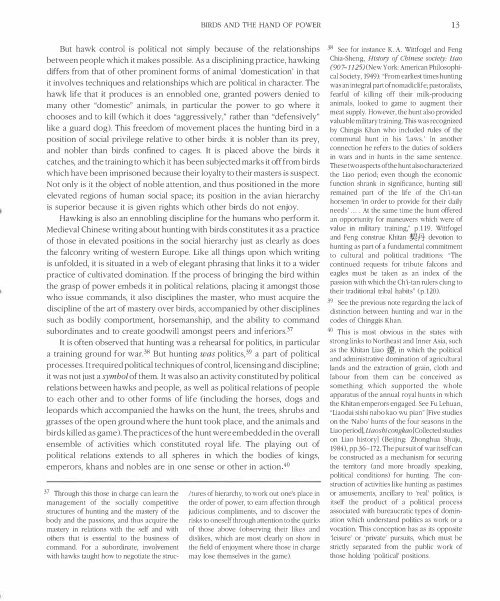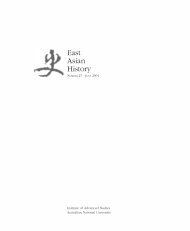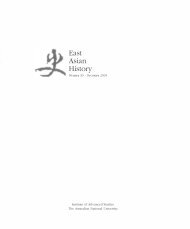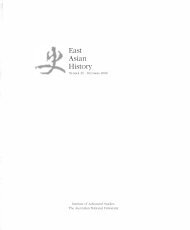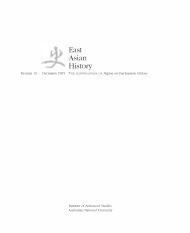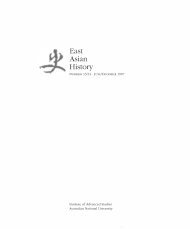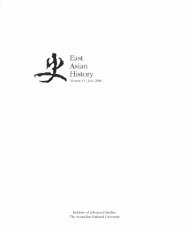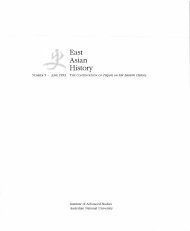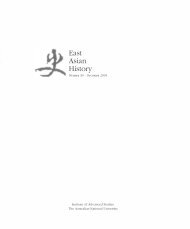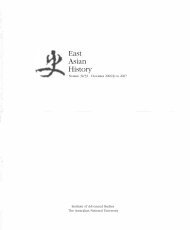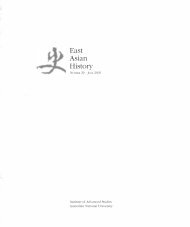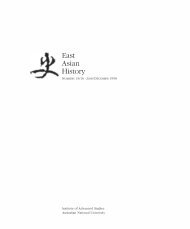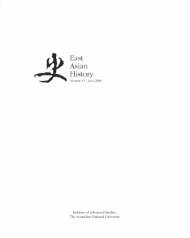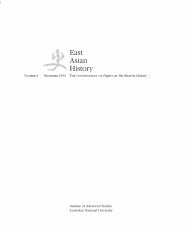East Asian History - ANU
East Asian History - ANU
East Asian History - ANU
- No tags were found...
Create successful ePaper yourself
Turn your PDF publications into a flip-book with our unique Google optimized e-Paper software.
BIRDS AND THE HAND OF POWER13But hawk control is political not simply because of the relationshipsbetween people which it makes possible. As a disciplining practice, hawkingdiffers from that of other prominent forms of animal 'domestication' in thatit involves techniques and relationships which are political in character. Thehawk life that it produces is an ennobled one, granted powers denied tomany other "domestic" animals, in particular the power to go where itchooses and to kill (which it does "aggressively," rather than "defensively"like a guard dog). This freedom of movement places the hunting bird in aposition of social privilege relative to other birds: it is nobler than its prey,and nobler than birds confined to cages. It is placed above the birds itcatches, and the training to which it has been subjected marks it off from birdswhich have been imprisoned because their loyalty to their masters is suspect.Not only is it the object of noble attention, and thus positioned in the moreelevated regions of human social space; its position in the avian hierarchyis superior because it is given rights which other birds do not enjoy.Hawking is also an ennobling discipline for the humans who perform it.Medieval Chinese writing about hunting with birds constitutes it as a practiceof those in elevated positions in the social hierarchy just as clearly as doesthe falconry writing of western Europe. Like all things upon which writingis unfolded, it is situated in a web of elegant phrasing that links it to a widerpractice of cultivated domination. If the process of bringing the bird withinthe grasp of power embeds it in political relations, placing it amongst thosewho issue commands, it also disciplines the master, who must acquire thediscipline of the art of mastelY over birds, accompanied by other disciplinessuch as bodily comportment, horsemanship, and the ability to commandsubordinates and to create goodwill amongst peers and inferiors. 37It is often observed that hunting was a rehearsal for politics, in particulara training ground for war.38 But hunting was politics,39 a part of politicalprocesses. It required political techniques of control, licensing and diScipline;it was not just a symbol of them. It was also an activity constituted by politicalrelations between hawks and people, as well as political relations of peopleto each other and to other forms of life (including the horses, dogs andleopards which accompanied the hawks on the hunt, the trees, shrubs andgrasses of the open ground where the hunt took place, and the animals andbirds killed as game). The practices of the hunt were embedded in the overallensemble of activities which constituted royal life. The playing out ofpolitical relations extends to all spheres in which the bodies of kings,emperors, khans and nobles are in one sense or other in action 4037 Through this those in charge can learn themanagement of the SOcially competitivestructures of hunting and the mastery of thebody and the paSSions, and thus acquire themastery in relations with the self and withothers that is essential to the business ofcommand. For a subordinate, involvementwith hawks taught how to negotiate the struc-/tures of hierarchy, to work out one's place inthe order of power, to earn affection throughjudicious compliments, and to discover therisks to oneself through attention to the quirksof those above (obselving their likes anddislikes, which are most clearly on show inthe field of enjoyment where those in chargemay lose themselves in the game).38 See for instance K. A. Wittfogel and FengChia-Sheng, <strong>History</strong> oj Chinese society: Liao(907-1125) (New York: American PhilosophicalSOCiety, 1949): "From earliest times huntingwas an integral part of nomadic life; pastoralists,fearful of killing off their milk-producinganimals, looked to game to augment theirmeat supply. However, the hunt also providedvaluable military training. This was recognizedby Chingis Khan who included rules of thecommunal hunt in his 'Laws.' In anotherconnection he refers to the duties of soldiersin wars and in hunts in the same sentence.These two aspects of the hunt also characterizedthe Liao period; even though the economicfunction shrank in Significance, hunting stillremained part of the life of the Ch'i-tanhorsemen 'in order to provide for their dailyneeds' ... . At the same time the hunt offeredan opportunity for maneuvers which were ofvalue in military training," p.119. Wittfogeland Feng construe Khitan ft devotion tohunting as part of a fundamental commitmentto cultural and political traditions: "Thecontinued requests for tribute falcons andeagles must be taken as an index of thepassion with which the Ch'i-tan rulers clung totheir traditional tribal habits" (p.l20).39 See the previous note regarding the lack ofdistinction between hunting and war in thecodes of Chinggis Khan.40 This is most obvious in the states withstrong links to Northeast and Inner Asia, suchas the Khitan Liao JI, in which the politicaland administrative domination of agriculturallands and the extraction of grain, cloth andlabour from them can be conceived assomething which supported the wholeapparatus of the annual royal hunts in whichthe Khitan emperors engaged. See Fu Lehuan,"Liaodai sishi nabo kao wu pian" [Five studieson the 'Nabo' hunts of the four seasons in theLiao period], Liaoshi congkao [Collected studieson Liao history] (Beijing: Zhonghua Shuju,1984), pp.36-172. The pursuit of war itself canbe constructed as a mechanism for securingthe territory (and more broadly speaking,political conditions) for hunting. The constructionof activities like hunting as pastimesor amusements, ancillary to 'real' politics, isitself the product of a political processassociated with bureaucratic types of dominationwhich understand politics as work or avocation. This conception has as its opposite'leisure' or 'private' pursuits, which must bestrictly separated from the public work ofthose holding 'political' positions.


